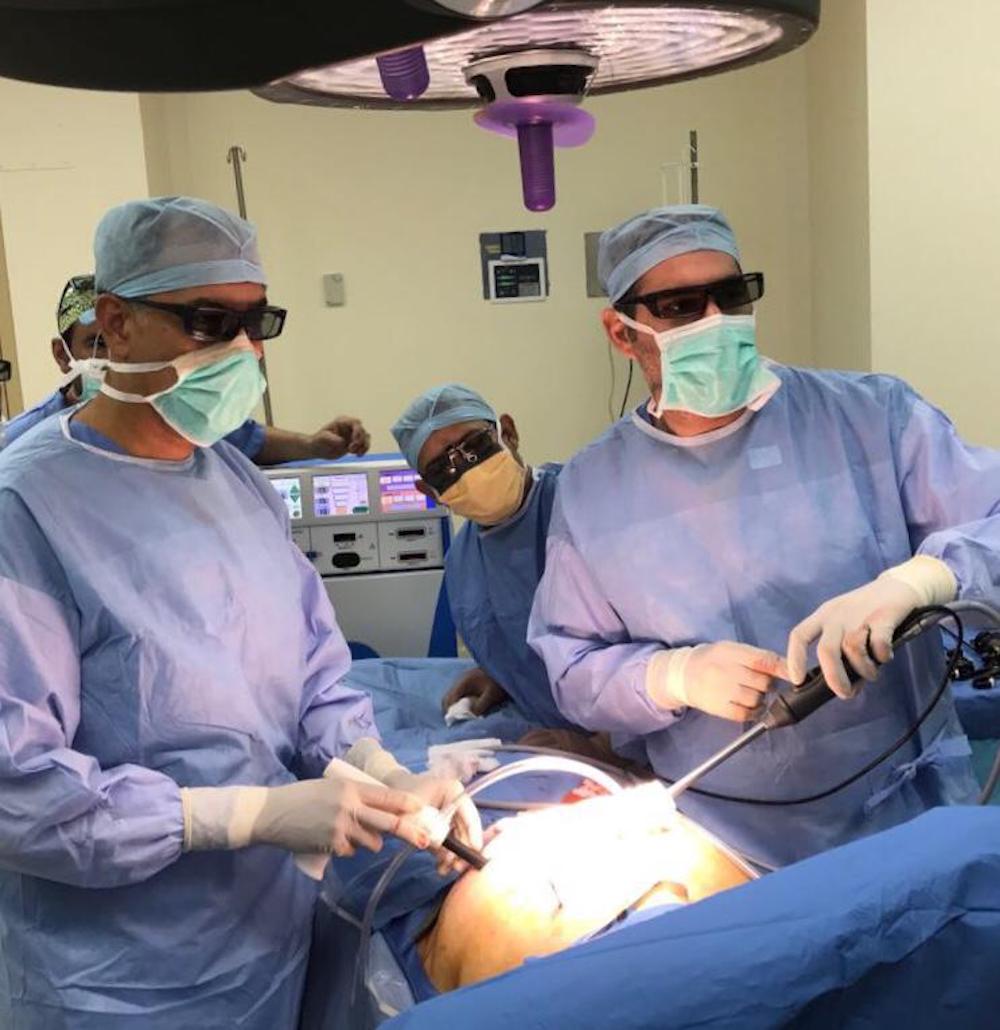The Gastric Sleeve is a restrictive type procedure because it decreases the size of the stomach, it also has a metabolic effect since it produces beneficial hormonal changes.
Gastric Sleeve surgery consists of giving the stomach the shape of a sleeve or tube, sectioning through staples and removing the largest part of the stomach, decreasing its size by approximately 70-80%, leaving it with a capacity of 150-200 ml.
Advantages of Gastric Sleeve Surgery
• The continuity of the intestine is not altered so that the food can be used in its entirety.• Reduces the anxiety to eat.
• Loss of weight greater than with the gastric band and the gastric plication.
• Lower rate of complications than gastric bypass.
• Rapid decrease in risk of mortality due to other diseases related to obesity: Diabetes, Hypertension, Dyslipidemias, Metabolic Syndrome.
Questions patients have before and after Gastric Sleeve Surgery
- What is a bariatric surgery or surgery for the obesity management?Is the specialty of surgery dedicated to the treatment of obesity through surgical interventions. There are several types of bariatric surgery and it is best to consult a specialist to determine what is the most successful procedure for the person. Bariatric surgery is a gastrointestinal procedure to treat obesity, it ́s not a cosmetic surgery. It is an option for people who suffer from severe or morbid obesity and cannot lose weight by traditional means or who have serious health problems related to these. This surgery promotes weight loss by restricting food intake and, in some cases, interrupting the digestive process.
- How to know if I’m candidate?
The first thing is to observe the levels of obesity. To determine if a person has obesity or overweight problems, it is best to determine your body mass index (BMI). This calculation is made considering the weight and height of the person. A person is considered to be obese when his BMI is above 30 kg / m2. If the BMI is above 35 is considered severe obesity and above 40 is called morbid obesity. - What are the main benefits of Bariatric Surgery?
Among the greatest benefits are those associated with conditions related to obesity. Most patients who undergo surgery suffer from hyperlipidemias or diseases such as: type II diabetes, high blood pressure, high blood cholesterol levels, sleep apnea and osteoarthritis problems, among others. After the first months, there are significant reductions in the levels of sugar, cholesterol, high blood pressure.
Without a doubt, the drastic weight loss is the most visible and significant benefit. The decreases can go from 70 to 100 percent of the excess. This loss usually occurs during the first 18 months after the operation. Other benefits reported by patients have to do with regaining the ability to move. After the loss of weight, mobility increases markedly by eliminating or reducing body aches and pains. Generally it also increases the capacity to perform any physical activity. - In psychological matters, patients also report benefits related to their self-esteem. Which is considered a great benefit.
- Surgery risks?
In the case of patients who resort to laparoscopic surgery for the obesity management, without a doubt, the risk of the operation is much lower than the risks associated with other conditions caused by obesity. There are different solutions for the management of Obesity, the patient together with our medical team will determine which is the best option. - Average time of hospitalization?
Each case is different, depending on the characteristics of each patient and whether or not there are post-operative complications or the patient’s own conditions that may affect their recovery.
Generally after a 24-h observation process, if the patient evolves properly, it can be discharged. While patients remain under our care, they receive quality care and remain under constant observation. - When can I go back to work?
Each case is different. Between 2 and 6 weeks. Patients must be rigorous in complying the medical indications so that they can quickly rejoin their normal rhythm of life. - Is it true that after surgery for obesity, hair loss can be experienced?
In some cases, weight reduction is accompanied by a decreased capacity for nutrient absorption. The most common of the nutrients that are poorly absorbed is zinc. This is a normal consequence and with adequate nutritional supplements, patients can compensate for their zinc levels.
Clinical studies have determined that the main effect is the malnutrition that hair loss causes after a bariatric surgery, but it is TEMPORARY since after the sixth month of the hair the hair regains its vitality and strength but it is also recommended to use some type of treatment that helps strengthen it. - After having surgery for obesity, should a diet be followed?
After surgery, the patient must undergo a rigorous diet. Chewing very well and eating slowly, as well as eating several times a day, will be part of the new eating habits. Gradually, the patient can return to a normal rhythm of life and can eat practically everything but in moderation.
However, balanced diet and exercise should be part of your new lifestyle.
Many thanks to Dr Jorge Esmeral and his team for providing this informative article.
Dr Jorge Esmeral is a General Surgeon and Bariatric Surgeon with many years of experience helping national and international patients with Bariatric and General Surgeries and his clinic is located at CIMA Hospital, San José.


















